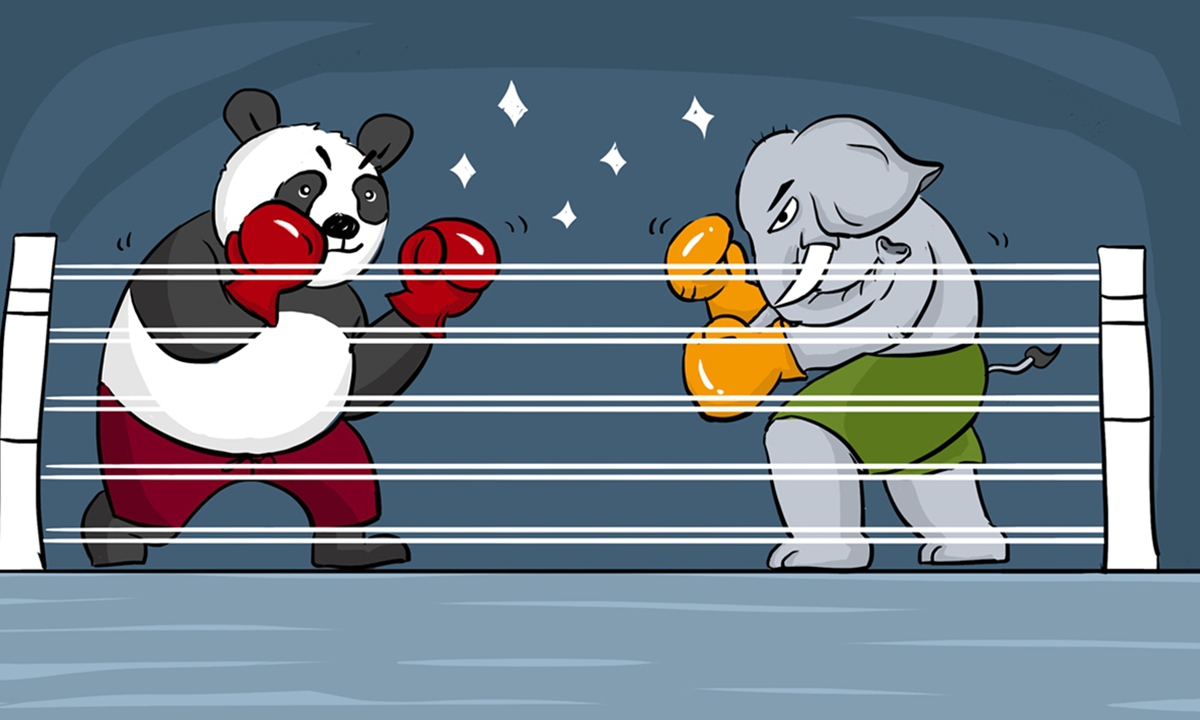India lies about casualties in border clash with China
By Hu Xijin Source: Global Times Published: 2020/9/17 22:37:02

China India Photo: GT
Indian Defense Minister Rajnath Singh declared on Tuesday that the Indian army inflicted heavy casualties on the Chinese army in the June 15 skirmish in Galwan Valley. Such rhetoric is aimed at inspiring Indian nationalist forces, and I will expose this lie today. According to the information from people familiar with the situation from the Chinese side, the number of Chinese soldiers who sacrificed their lives during the conflict was far less than the number of India's. Twenty Indian soldiers died in the clash, many of whom were wounded and frozen to death as they could not get medical treatment. But it could be counted as a huge loss even if only one Chinese soldier died.
Based on what I know, frontline officers and soldiers of the Chinese People's Liberation Army (PLA) are brave and united. Most of them were born in the 1990s, or even 2000s. In the face of the sudden conflict, none of them showed fear.
The Indian troops failed to honor their promise. A few officers and soldiers of the Chinese army went to the border area which the Indian troops illegally trespassed into for negotiation, but the Indian army attacked them without any warning, leading to the clash.
At the start of the skirmish, the Chinese soldiers were outnumbered, but some of them fought to their last breath, and no one was captured by the Indian army. The Indian troops fled in great disorder after the Chinese army began to counterattack, with some rolling down the mountains and some falling into the river. Quite a number of Indian soldiers surrendered to the PLA, and were captured.
In the latest conflict near the Pangong Tso Lake, Indian troops "preempted" PLA's activity (meaning they illegally trespassed the border), and showcased that they had gained an advantage by occupying highlands and throwing stones at the PLA. But based on what I know, brave PLA soldiers disregarded the Indian threats and drove away the Indian troops from the highlands. The Chinese army has gained advantageous positions at many points in the standoff.
People familiar with the situation told me that frontline officers and soldiers of the PLA now have high morale at the China-India border. The Indian troops are no match for them at all. The conflicts this year have severely dampened Indian troops' arrogance in nibbling at Chinese territory, making India re-examine their understanding of China's determination, and will to resolutely defend its territorial sovereignty.
Chinese and Indian foreign ministers reached a five-point consensus in Moscow last week. We sincerely hope the consensus can be fully implemented for a turning point in the China-India border situation. But this requires the Indian government and society to calm down and form a collective rationality on China-India ties. If India intends to rough up on the border issues, it will only suffer losses without gaining the advantage it wants.
The morale of the Indian army cannot be compared to that of the PLA, nor can the Indian army's equipment or India's national strength be matched to those of China. As far as I know, the PLA has fortified its position at the China-India border area, and its logistical capability is highly advanced. The PLA officers and soldiers on site can enjoy a variety of hot dishes. It is no problem for them to spend the winter there. The PLA can launch a heavy counterattack at the Indian army's new provocation at any time, and Chinese people believe that the PLA will never be gentle to the provocative Indian troops in the future. This means the Indian army will not become a bargaining chip for India to realize its unreasonable demands at the border. Resolving disputes through negotiations is not only a good choice for both sides, but the only option for India.
Last but not least, I would like to pay tribute to the brave frontline PLA officers and soldiers, to the heroic souls of the martyrs, and to the diplomats fighting on complicated forefronts.
The author is editor-in-chief of the Global Times. opinion@globaltimes.com.cn
Posted in: VIEWPOINT,CHINA-INDIA